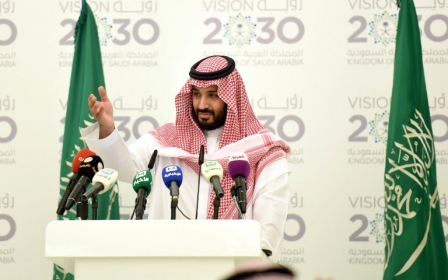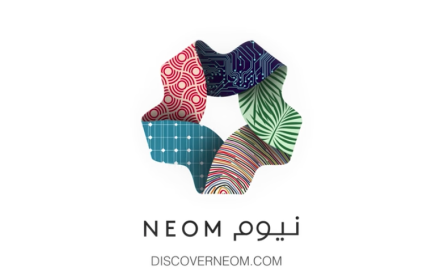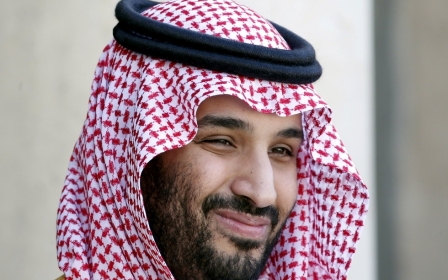IMF tells Gulf states to speed up switch from oil
The IMF on Tuesday advised energy-rich Gulf economies to speed up their diversification away from oil after projecting the worst growth for the region since the global financial crisis.
The Washington-based organisation also said that a prolonged rift between Qatar and its Gulf neighbours could further dampen growth across the region.
Oil exporters in the Middle East, especially those in the Gulf Cooperation Council, have been hit hard by the collapse in crude prices which provided a major part of their finances.
Following the slump, GCC members Bahrain, Kuwait, Oman, Qatar, Saudi Arabia and United Arab Emirates undertook fiscal measures and reforms to cut public spending and boost non-oil revenues.
As a result, economic growth has slowed considerably as the GCC six and other regional oil exporters posted huge budget deficits.
In its Regional Economic Outlook, the International Monetary Fund on Tuesday projected GCC economic growth at just 0.5 percent this year, the worst since the 0.3 percent growth in 2009 following the global financial crisis.
"It is the right time for GCC economies to accelerate their diversification outside oil and to promote a greater role for the private sector to lead growth and create additional jobs," said Jihad Azour, director of the Middle East and Central Asia at IMF.
'It is the right time for GCC economies to accelerate their diversification outside oil and to promote a greater role for the private sector to lead growth and create additional jobs'
Jihad Azour, director of the Middle East and Central Asia at IMF
"Preparing their economies to the post-oil era is something that is becoming a priority for authorities all over the GCC," Azour told AFP.
"We are seeing governments developing diversification strategies and introducing a certain number of reforms to allow the economy to be prepared for the post-oil era. And those are important reforms," he said.
Qatar crisis could lead to 'erosion of confidence'
The International Monetary Fund, however, said also that if the crisis with Qatar drags on, it will negatively impact mid-term growth prospects for the six-nation GCC.
"A protracted rift could weaken medium-term growth prospects, not only for Qatar but also for other GCC countries," the report said.
'A protracted rift could weaken medium-term growth prospects, not only for Qatar but also for other GCC countries'
IMF Regional Outlook report
If the rift continues, it will "slow progress toward greater GCC integration and cause a broader erosion of confidence, reducing investment and growth, and increasing funding costs in Qatar and possibly the rest of the GCC."
Saudi Arabia, the United Arab Emirates, Bahrain and Egypt on June 5 severed diplomatic ties with Qatar and imposed an economic blockade, accusing Doha of promoting extremist groups.
Qatar, which is a member of the Gulf Cooperation Council alongside Bahrain, Kuwait, Oman, Saudi Arabia and the United Arab Emirates, has denied the charges.
The report said the crisis had resulted in some financial pressures on Qatar as its sovereign credit rating and outlook had been downgraded, raising interbank interest rates and leading to a decline in private sector deposits.
The initial impact on Qatari banks has largely been mitigated by liquidity injections by the central bank and increased public sector deposits, the IMF said.
Last month, Moody's Investors Service estimated that around $30 billion were withdrawn from Qatar's banking system in June and July.
Moody's estimated that Qatar used $38.5 billion - equivalent to 23 percent of its GDP - to support the economy in the first two months of sanctions.
Non oil sector on rise
Azour said the GCC growth projections are mainly driven by the oil producers deal to cut output to bolster low crude prices which meant GCC states pumped and exported less oil.
The IMF report also projected that the economies of oil exporters in the Middle East and North Africa - also including Iran, Iraq, Algeria, Libya and Yemen - would grow 1.7 percent, down from 5.6 percent the previous year.
MENA oil importers, on the contrary, were expected to expand 4.3 percent this year, up from 3.6 percent in 2016, the report added.
Azour said the IMF was projecting flat growth this year for Saudi Arabia, the largest economy in the MENA region, but the non-oil sector was growing faster than expected.
This was an indication "that the Saudi economy is bottoming up and it shows that the gradual implementation of the fiscal adjustment now is going to allow the Saudi economy to grow faster," Azour said.
He estimated that Saudi Arabia and UAE could achieve a fiscal balance by between 2020 and 2022.
Azour said the introduction of the five percent value-added tax (VAT) was one of the reform measures that would allow the GCC countries to diversify their revenues away from oil.
"Its low rate will have a limited impact on price rise and inflation," said Azour, adding that VAT is estimated to generate between 1.5 and two percent of gross domestic product annually.
So far, Saudi Arabia and UAE have said they would apply the tax at the start of next year while the remaining four nations have the whole of 2018 to implement it.
The IMF also endorsed an ambitious Saudi Arabian plan to build a $500-billion business and industrial zone extending into Jordan and Egypt, saying the project could benefit the whole region.
Azour said Riyadh would need to balance the huge cost of the scheme and other economic projects with its drive to cut a big state budget deficit caused by low oil prices.
But the plan to develop the zone, known as NEOM, could stimulate trade and allow the Middle East to capitalise on its location as a bridge between Asia and Europe, Azour said.
"It is a signal that greater regional cooperation is back on the table," he said. "We see value and necessity in regional cooperation."
New MEE newsletter: Jerusalem Dispatch
Sign up to get the latest insights and analysis on Israel-Palestine, alongside Turkey Unpacked and other MEE newsletters
Middle East Eye delivers independent and unrivalled coverage and analysis of the Middle East, North Africa and beyond. To learn more about republishing this content and the associated fees, please fill out this form. More about MEE can be found here.




